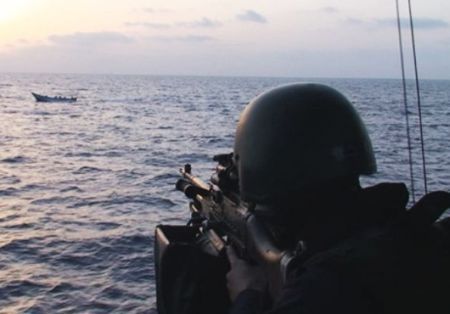
More ship insurers are backing the use of private armed guards on merchant vessels at sea to combat Somali piracy as attacks and the resulting costs are set to rise in coming weeks, industry officials said.
Pirate attacks on oil tankers and other ships are costing the world economy billions of dollars a year and navies have struggled to combat the menace, especially in the vast Indian Ocean. Seaborne gangs are set to ramp up attacks in the area after the monsoon season ends.
A famine crisis in Somalia could also draw more people into piracy, marine insurers said.
“Piracy is clogging the arteries of globalization,” said Emma Russell with underwriter Watkins, a member of the Lloyd’s of London insurance market. “No vessel with armed guards has yet been taken,” she added.
Industry delegates at the annual conference of the International Union of Maritime Insurance (IUMI) said there were more than 20,000 transits a year in the Gulf of Aden and the Indian Ocean.
Speakers at the conference said the hiring of private armed guards to accompany ships is increasingly seen as an effective deterrent against pirates and as a complement to overstretched navies, many of whom face budget cuts.
Ship owners and insurers have until recently been reluctant to accept the use of armed private contractors. They have hesitated partly due to legal liabilities and risks, including the problem of bringing weapons into some territorial waters and due to the fear of escalating violence.
The IUMI said the use of private guards should comply with the legislation of the flag state. “It’s not going to resolve the problem but at least it’s going to protect some of the vessels and property going through the Indian Ocean,” IUMI President Ole Wikborg said of private armed guards at a press briefing.
Individual insurers rejected any suggestion they were profiting from providing piracy cover, saying premiums did not usually cover their costs in ransom and damage claims, and with most piracy claims being met except where war conditions applied.
French maritime economics institute ISEMAR said there were about 1,000 private guards being employed by ships to counter Somali pirates.
Industry group the Security Association for the Maritime Industry (SAMI), which has 58 members, is aiming to have the first companies complete an accreditation process by the second quarter of 2012, founding member Peter Cook said.
This will result in a list of audited security firms able to provide armed guards. Cook said private firms would play an increasing role as navies face spending reviews, citing prospects of a 30 percent decline in the size of Western navies in the next 20 years. “They’re taking the policemen off the block,” he said.
Ship owner associations, meanwhile, have called on the United Nations to create an armed military force to be deployed on vessels to counter piracy and restrict the growth of unregulated private contractors.
Attacks by Somali pirates could rise to 250 in 2011 from about 200 in each of the two previous years, and pirates’ profits have already outstripped last year’s $80 million by reaching some $120 million in the year as of September, Captain Xavier Mesnet of the French Navy, told the conference.
The use of private security avoided the need for intervention by navies but would also likely lead pirates to change tactics and use greater violence, he said. He told Reuters the French navy had no plans to scale down its counter piracy mission.
We use cookies to improve your experience. By continuing to use our site, you accept our Cookies, Privacy Policy,Terms and Conditions. Close X